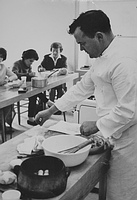Remembering Joe Hyde, Neighbor and Celebrated Chef
Joe Hyde died on Friday, February 23rd at Nyack Hospital from complications of emphysema. His children Anne Tonetti Hyde (Dunsmore), Philip Lawrence Hyde and Barry Lawrence Hyde were with him when he died. Joe was born in Palisades in 1927. His mother Lydia was a daughter of Mary Tonetti, the legendary matriarch of Snedens Landing. His father, Robert Hyde, left the family after a few years, returning to California to marry his childhood sweetheart. Joe became a celebrated chef and ran a cooking school in Palisades from 1960 to 1966.
He married Abigail Wrenn and had three children. In 1971 Joe authored a brilliant cookbook, Love, Time and Butter. In his later years he resided in Snedens in the house built by his older sister Angy in the 1950s. At the time of his death he was a resident at a senior living facility, Dowling Gardens, in Sparkill, NY which is run by Dominican nuns. There he continued his trademark of entertainment by turning quiet bingo and poker games into wild affairs usually ending with a reprimand from the sisters who would sternly refer to him as “young man.” His daughter Anne said, “With his last breath so went a magical era in Sneden’s that none of us who lived any part of it, will ever forget.”
Excerpts from Robert Boyle’s November 9, 1971 article in Sports Illustrated give an idea of Joe’s colorful career.
“Upon graduating from Trinity College in Hartford in 1950, Hyde decided on a conventional enough career, the hotel business, because he enjoyed meeting people. He went to work at the Hotel Raleigh in Washington, D.C., and there he was started in the kitchen. He perceived immediately, he says, that cooking was to be his destiny. He spent three weeks with the roast cook, two weeks in the pastry shop, three weeks in cold meat and a week in the storeroom, where his first task was to clean all the cans on the shelves. He had no sooner absorbed the location of the canned goods than he was drafted into the Army. There, amazingly, he wound up serving as a cook for a heavy‑mortar company in Korea. Hyde took along a Betty Crocker cookbook. ‘When the menu said steak, I always made stew,’ he recalls. ‘I made a casserole with the hamburger meat. I browned the meat, poured off the fat, added garlic, bay leaf, onion and tomato puree and simmered the sauce for two hours. Then I put layers of cooked elbow macaroni, sauce and sliced American cheese into the deep pans until they were full. The whole affair was baked for an hour; one pan went out to each platoon. The boys liked it. They called it Holy Mattress.’
On his return to civilian life, Hyde worked as a room clerk at the Statler Hotel in New York for six months before going to France. There, through UNESCO, he got a job as an apprentice in Chez Nandron, a two‑star restaurant in Lyons, considered by some to be the culinary capital of France. His first day was almost a disaster. The usual apprentice is a 13‑year‑old. Here was Hyde, the only American apprentice in the country, 25 years old, burly and almost six feet tall. When he appeared in the kitchen dressed in white, the dozen cooks stopped working to stare in amazement. With an atrocious accent, Hyde introduced himself. ‘Bond Jour!’ he exclaimed. ‘Je m’appelle Joe!’ Several of the cooks almost swooned. ‘I was the grossest thing that had ever happened to French cooking,’ Hyde says. ‘They had never seen anyone like me before. And the name Joe. They flipped out over it. It sounds like a peasant’s name. Even today French chefs who have known me for years recoil at the mention of it. They always call me Joe‑ceph!’
Given this appalling debut, Hyde was assigned the lowest job in the scullery, plucking larks beneath a splashing drainboard. Eventually, because of his age, the first cooks allowed Hyde to eat with them, and he acquired a taste for fried tripe, pig heads and coq au vin made with just the peeled chicken gizzards.
Hyde next became an assistant poissonier, or fish cook, at the Pyramide in Vienne. At the time it was regarded by many as the best restaurant in the world. While there, Hyde, a follower of the turf, won $1,000 in the tierce, a form of French off‑track betting. According to one local custom, a winner is supposed to spend it all on one spree. Hyde invited nearly two dozen friends, including the man who had sold him the ticket, to dine at the famed Pont de Collonges. ‘It was a fantastic, endless meal,’ he recalls. ‘I ate two pheasants. We had a meringue and ice cream dessert that was four feet tall. Each tier was covered with spun sugar and illuminated with a little light inside. We drank the finest of champagne — it didn’t have anything written on it except dust.’
After two years in France, Hyde returned to the U.S. to become chef at the Jupiter Island Golf Club in Hobe Sound, Fla. One of his triumphs there was a chicken poached inside a pig’s bladder, which he prepared for Sir Osbert Sitwell and Marshall Field. Hyde had brought a supply of pig bladders back from France. When he tried to import some more on a later trip, U.S. Customs seized them, and ever since he has had to make‑do with ones gotten from local slaughterhouses. Once while he was cooking at Chalet Frascati in Santa Monica, Calif., he procured some bladders, cleaned them, blew them up through a stick of macaroni and set them out to dry on a clothesline. One of them got away and sailed over the fence like an expiring balloon. Hyde’s wife, Gail, ran next door, shouting to the neighbors, ‘Excuse me, but one of my husband’s bladders just landed in your yard.’
…. When his mother’s home in Snedens Landing fell vacant, he returned East to teach in the family mansion known as The Old Library because it had served as one in the 19th century. …Hyde’s classes were held in the enormous kitchen with its original fireplace.
In a roundup of cooking schools, the New York Times went beyond the city line to include Hyde’s because his classes had ‘too much merit.’ Similarly another Manhattan food expert wrote, ‘It is not my custom to concern myself with matters beyond the limits of my own borough, but I have an excuse in this case that I would go a lot farther afield than Rockland County to find a teacher with Mr. Hyde’s combined gifts for cooking and teaching.’
In 1966 Hyde gave up his classes to cater full time and shifted his kitchen from The Old Library to a sort of miniature palace nearby built by his uncle, Eric Gugler, an architect and designer of the executive offices in the West Wing of the White House. There amid historic frescoes, triumphant arches and heroic busts, Hyde turns out smoked bluefish, stuffed eggs, poached salmon, orange mousse and other dishes that can be prepared prior to a dinner party. Hyde is thus well prepared when he arrives at a client’s house with his staff of six, headed by Selma Andersen, a brisk Swedish woman who superintends the table setting while the chef himself prepares the canapés, beats the oven for the saddles of lamb, sautés endives air‑expressed from Belgium and chops shallots. Hyde never goes anywhere without shallots. Just in case he might find them unavailable, he keeps a supply in the glove compartment of his truck. ‘And I always have kosher salt with me,’ he says. ‘I just love the feel of it.…"
You can find more information about Joe on a web site the family has created, www.celebratingjoehyde.com


